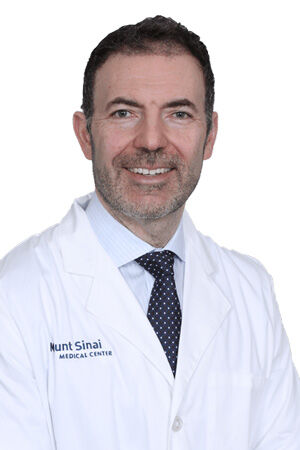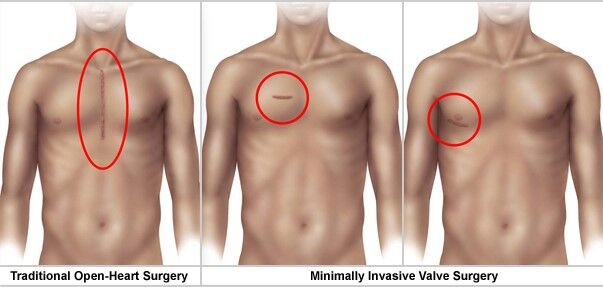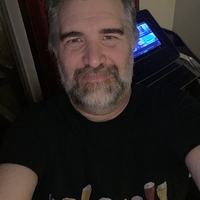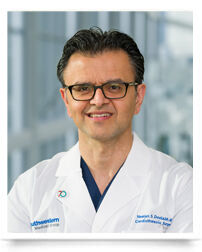Doctor Q&A: Minimally-Invasive Multiple Heart Valve Surgery
Written By: Adam Pick, Patient Advocate, Author & Website Founder
Medical Expert: Eric Weiss, MD, President of Cardiothoracic Surgery, Mount Sinai Medical Center
Page Last Updated: June 3, 2025
With the ongoing trend to minimally-invasive techniques for heart valve surgery, patients often wonder, “Is it possible to treat multiple forms of heart valve disease using less invasive procedures during one operation?”
To answer this important question, we interviewed Dr. Eric Weiss, the President of Cardiothoracic Surgery at Mount Sinai Medical Center in Miami Beach, Florida. Doctor Weiss is a minimally-invasive specialist who has successfully treated many patients in our community including Deirdre Hallet, Patrick Kerrigan and Maureen Hoffman.
Key Learnings About Minimally-Invasive Multiple Heart Valve Surgery
Here are the key learnings from Dr. Weiss’ interview about less invasive approaches to treating multiple heart valve defects during the same operation:
- It is common for patients to be diagnosed with multiple forms of heart valve disease. In fact, a problem with one valve can cause back-pressure in the heart that can ultimately cause a second valvular disorder.
- There are two main causes of heart valve disease. “Acquired” heart valve disease results from risk factors including smoking, diabetes, high blood pressure and high cholesterol. “Congenital” heart valve disease results from genetic or other issues that impact the formation of the heart during pregnancy. Patients with congenital heart valve disease are born with the disease.

Dr. Eric Weiss (Heart Surgeon)
- Patients with multiple forms of heart valve disease have more risk due to the added strain and stresses on the heart.
- To treat patients with multiple forms of heart valve disease, Dr. Weiss and his team uses a multi-disciplinary, team approach to evaluate the heart and then develop a safe-and-effective plan to treat the heart which may include surgical and/or transcatheter approaches.
- Dr. Weiss frequently uses minimally-invasive approaches to treat multiple heart valve disorders during the same operation. Dr. Weiss states, “I try my best in every patient to avoid having to do what’s called a sternotomy or an open-heart incision. We use a variety of techniques to keep treatment for valve disease very minimally invasive. We often do minimally invasive multivalve surgery – whether it be repair or replacement – through the side of the chest.”

- It is possible to use a combination of both surgical and transcatheter procedures during a single operation for multi-valve disease. Dr. Weiss states, “We sometimes do a combination of transcatheter valves with open valve repair and replacement, a TAVR valve with a minimally invasive mitral valve replacement, for example. Or sometimes, we will do two transcatheter valves without having to do any type of open surgery.”
- For Dr. Weiss and his team, patient outcomes have been excellent for multi-valve procedures. Dr. Weiss states, “At our institution, I tell people that our risk of mortality or death from a multivalve, minimally invasive multivalve surgery is about 0.5 percent. The risk of stroke is also about 0.5 percent.”
- The goal for Dr. Weiss and his use of minimally-invasive techniques is to help patients recover faster. Dr. Weiss states, “We’re willing to try to tailor the operation to the patient in a way that gives them the quickest recovery, the least invasive, and gets them back to their lifestyle as quick as possible because that’s what everybody wants.”
Many Thanks Dr. Weiss!!
Many thanks to Dr. Weiss for taking the time to educate our patient community about minimally-invasive, multiple heart valve surgery and for taking such great care of the patients in our community!
Related Links:
Keep on tickin!
Adam
P.S. For the hearing impaired members of our community, I have provided a written transcript of the video below.
Video Transcript:
Adam Pick: Hi, everybody, it’s Adam with HeartValveSurgery.com. This is a surgeon question and answer session all about minimally invasive multivalve surgery. I’m thrilled to be joined by Dr. Eric Weiss. Dr. Weiss, it is great to see you again. Thanks for joining us today.
Dr. Eric Weiss: Adam, thank you so much. It’s a pleasure to be here with you.
Adam Pick: Dr. Weiss, I’m real excited for this conversation. To get started, how often do you see patients in your practice that have multiple forms of valve disease?
Dr. Eric Weiss: Actually, Adam, it’s really quite common for a couple of reasons. One is that oftentimes, patients who have valvular heart disease, whatever is causing that heart disease is not just affecting one valve, but can affect multiple valves, whether it’s something that’s acquired or something that they were born with. The second thing that’s notable is that oftentimes a significant problem with one valve can actually cause back pressure in the heart that can lead to a problem in another valve. I would say that it’s very frequent to see patients who come to me with a valve problem who have multiple valve diseases. Sometimes they both need treatment; sometimes, one needs treatment and we can just watch the other.
Adam Pick: Dr. Weiss, I’m curious to know, what are the causes of multiple valve disorders?
Dr. Eric Weiss: Actually, it’s interesting because the same factors that cause multiple heart valve disease are really the same factors that cause single heart valve disease. I think when you talk about heart valve disease, it’s really – there’s really two big categories of what can cause heart valve disease. There is acquired heart valve disease and congenital or genetically, the genetic cause of heart valve disease.
When you think about acquired heart valve disease, it’s really the same types of risk factors, some of the same types of risk factors that can cause vascular heart disease or coronary heart disease can cause valvular heart disease, so things that we know about like smoking, diabetes, high blood pressure, high cholesterol. Those are the factors that can cause vascular heart disease. They can also cause valvular heart disease.
On the other hand, there’s also a big group of valvular heart diseases that are caused by congenital reasons or genetic reasons. Sometimes you can be born with an abnormally structured heart valve that can lead it to fail a little bit earlier in life. There’s also genetic or familial syndromes that can lead to valvular heart disease. Whether it’s multivalve disease or single valve disease, it really falls into one of those two broad categories: either it’s something that’s acquired or something that’s congenital, in other words, something that you were born with.
Adam Pick: Dr. Weiss, are patients with multiple forms of valve disease at more risk?
Dr. Eric Weiss: Yes, they do have more risk than a single valve because the more valves that are affected in the heart, the more stress and strain that the heart is going to be under. When you’re talking about different chambers, different components of the heart, and each of them are under stress, whether it’s blood that’s leaking back because the valve is insufficient or whether it’s blood that can’t get through the valve well enough because the blood – because the valve is stenotic or too tight, all of those are going to put the patient at risk. It’s going to put the heart under stress. The more components that you add, the greater risk the patient is in. Then furthermore, the risk of fixing the valves becomes a little bit higher because now you’re talking about a more complicated procedure; in other words, instead of just replacing or repairing one valve, now you’re talking about repairing or replacing two valves or three valves. I would say that each valve that is involved makes the risk level just a little bit higher for each individual patient.
Adam Pick: Dr. Weiss, a big question from the patients is how do you treat multiple valve disease?
Dr. Eric Weiss: I think when you’re talking about multiple valve disease, the important thing to remember is that at our center and at all big valve centers, these decisions are usually made in a multidisciplinary approach where you have cardiologists, heart surgeons, and valvular heart specialists who come together to talk about what the best treatment for the patient is. When we see a patient with multivalve disease, we think about it in the same way that we think about single valve disease. The way I think about single valve disease is I try my best in every patient to avoid having to do what’s called a sternotomy or an open-heart incision.
We use a variety of techniques to keep treatment for valve disease very minimally invasive. We often do minimally invasive multivalve surgery, whether it be repair or replacement through the side of the chest in a minimally invasive approach. We sometimes do a combination of transcatheter valves with open valve repair and replacement, a TAVR valve with a minimally invasive mitral valve replacement, for example, or sometimes we will do two transcatheter valves without having to do any type of open surgery. We’re willing to try to tailor the operation to the patient in a way that gives them the quickest recovery, the least invasive, and gets them back to their lifestyle as quick as possible because that’s what everybody wants. We don’t have to sacrifice that approach even when we’re dealing with multiple valves versus just one valve.
Adam Pick: Dr. Weiss, I love hearing about all these minimally invasive innovations, but I’m sure one of the big questions that patients have is, what are your outcomes for minimally invasive multivalve surgery?
Dr. Eric Weiss: We’ve had excellent outcomes with both single valve surgery as well as multivalve surgery. At our institution, our risk, I tell people that our risk of mortality or death from a multivalve – minimally invasive multivalve surgery is about half of a percent. The risk of stroke is also about half a percent. This similar whether it’s a single valve repair/replacement or a multivalve repair/replacement. We really haven’t sacrificed our outcomes at all by providing the ability to do multiple valves through a minimally invasive approach.
The same is true when we do transcatheter valves. We have less than 1% risk of death and stroke in our series of transcatheter patients, whether it’s a transcatheter aortic valve replacement or also transcatheter mitral valve repairs and replacements. I think that’s an important point and one that all patients should be aware of is the outcomes of the surgery at the center you’re going to.
What I think is the best outcomes come from two things: one, having a team that works together and is very experienced, and two, doing a lot of it. I think that we have both of those things at our center. We have a very experienced team that works well together and also we do a tremendous amount of valve surgery. I’m really proud of the outcomes that we have here.
Adam Pick: Dr. Weiss, congratulations to you and your team there at Advocate Aurora Health in Milwaukee, Wisconsin for those fantastic outcomes. On behalf of our entire community, thanks so much for taking the time today to educate us on minimally invasive multivalve surgery.
Dr. Eric Weiss: Adam, thanks so much for having me. I really appreciate the opportunity to talk about this subject. I really appreciate all that you do for patients with heart valve disease. This is a tremendous program and website. Thanks for all that you do.
Adam Pick: Great, thanks so much, Dr. Weiss. Take care





